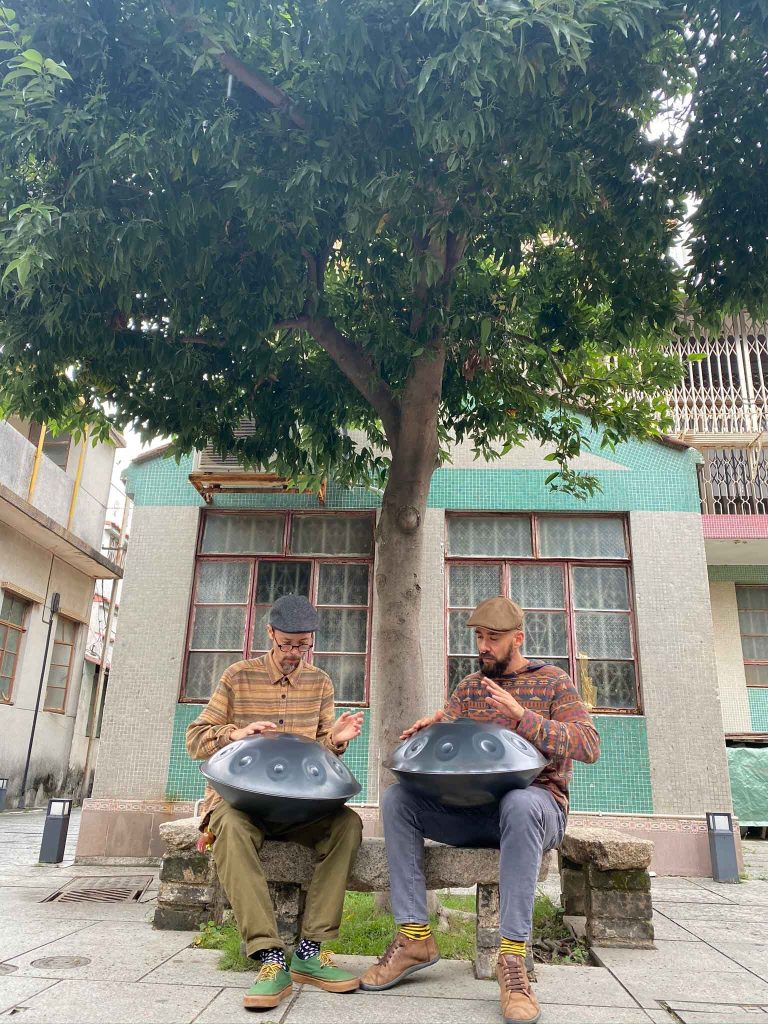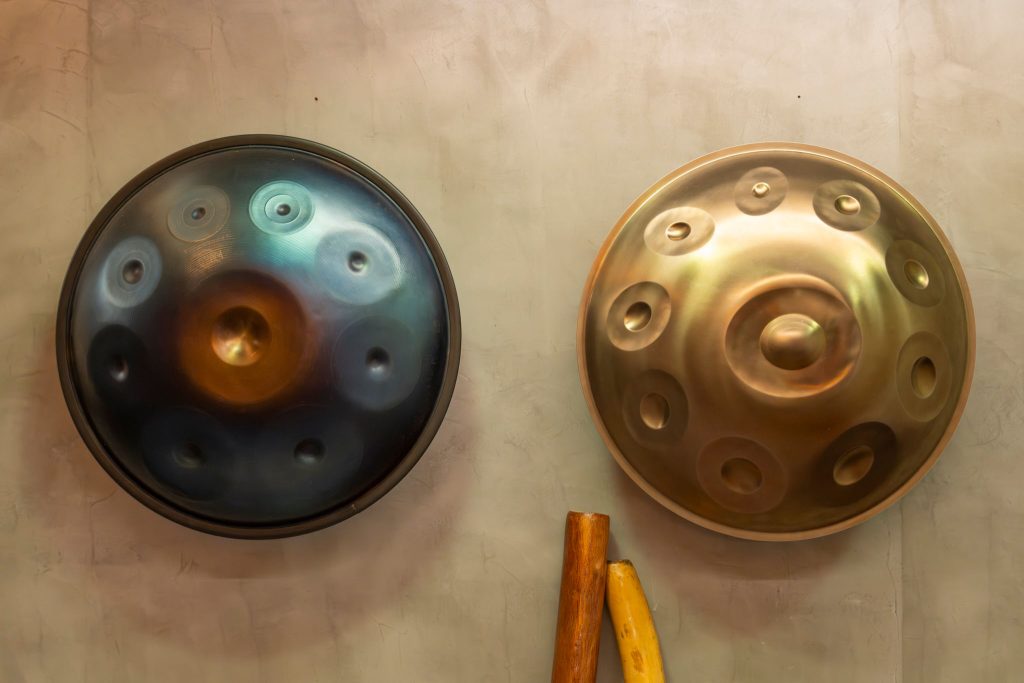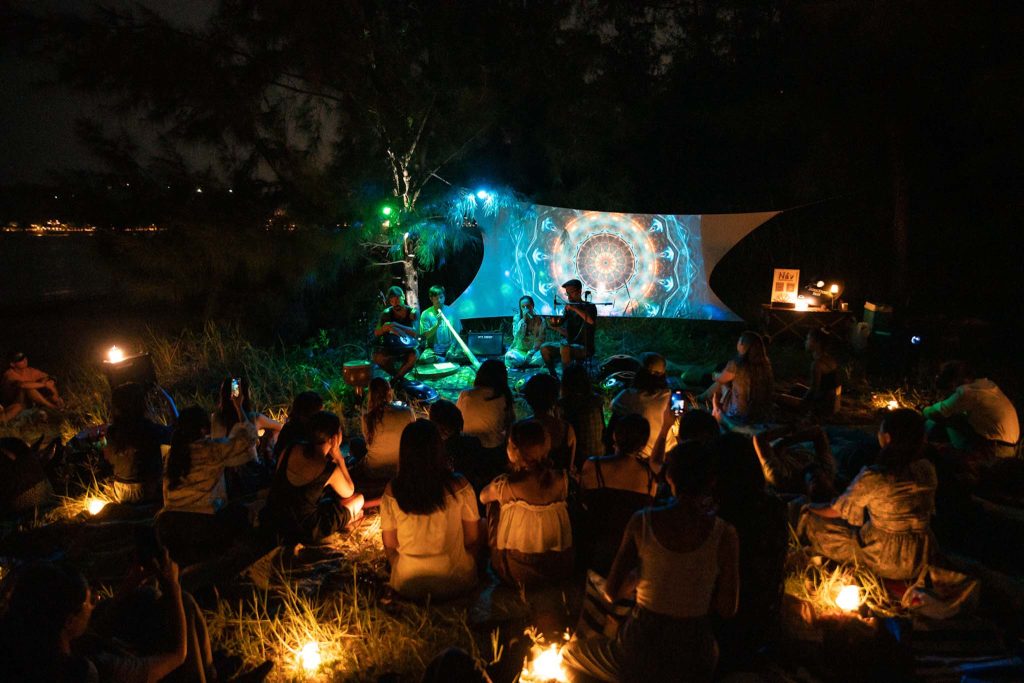Macao is already known as a city of gastronomy, art and architecture, so some might say it’s about time the burgeoning local music scene had its time in the sun. There’s a lot on offer – from indie rock and an informal jam scene, to songs sung in the endangered patuá language – and a symptom of this growth is an ever-expanding range of instruments bringing new sounds to the SAR. That includes, of late, the handpan.
Dave Wan and Manuel Variz can be thanked for helping popularise the hypnotic reverberations of this UFO-shaped idiophone (as instruments that make sounds through their own vibrations are called). Wan, 48, is a carpenter by trade and Variz, 43, is an art teacher. Since starting their band, Náv, in early 2020, the pair have worked hard to fit these day jobs around their love of making music with handpans.
It all started thanks to a mutual friend

The two men were introduced by a mutual friend in 2018, Yoga Loft’s Rita Gonçalves. When Gonçalves heard that Variz had started playing the handpan, she knew he had to meet Wan. “That’s when we jammed for the first time,” says Variz. “We enjoyed each other’s company, connected well and from that moment, it was just ideas and ideas.”
The pair spoke about their lives, their love of handpans and whether or not they should start a band. Wan was already in one at the time, but eventually decided he’d rather collaborate with Variz.
After busking and jamming in different spots around the city for a while – places like Na Tcha Temple and the Ruins of St. Paul’s – and posting videos on their social media, the duo started receiving invitations to play at events. The first was the Fringe Festival at Casa Garden in 2020, where they provided the background music for the play Hansel and Gretel. “They wanted us to create a song for them,” says Wan. “But more importantly, for us, that is where our first song came about.”
That song was titled Into The Woods. Not long after the Fringe Festival, the two established Náv. Local didgeridoo player Peter Kam joined them almost immediately. They also had a vocalist, for a time – Marta Bjerke was with the band for a year before returning to Portugal.
As for the band’s name, Variz explains it as the pair’s attempt to land on something connected to nature. “After some research, I stumbled across a Greek God named Pan – the god of shepherds and hunters, and the meadows and forests of the mountain wilds,” he says. “In ancient Greek, it is written as Πάν, which to me, looked like Náv. I was like ‘Wow’ and thought it was a cool idea, so we decided to stick with Náv.”
What exactly is a handpan?

The handpan’s history traces back to a type of steel drum developed in Trinidad and Tobago during the early 20th century. That so-called steelpan, originally made out of discarded oil barrels, is now the Caribbean country’s national instrument and often played at Caribbean carnival celebrations.
The handpans used by Variz and Wan are a relatively recent invention, produced by a Swiss company in the early 2000s. The instrument resembles a steel-plated flying saucer and releases mesmerizingly harmonic sounds when struck with a person’s hand. It’s perfect for meditation and relaxation.
Variz describes the music of handpans as “peaceful and beautiful,” while Wan says it’s an easy instrument to fall in love with.
The handpan belongs to the idiophone family of musical instruments, which produce sounds via vibrations when struck, scraped or shaken. Unlike membranophones, such as drums, this instrument does not involve a membrane. Rather, idiophones are solid – made out of metal, stone or wood. Along with handpans, the family includes bells, gongs and rattles.
Handpans are widely considered a simple instrument play, something Wan and Variz acknowledge as true. However, they add that while it’s easy to learn, it’s also hard to master.
Looking ahead

Náv have performed at more than 30 events across the SAR since 2020, including the Hush Music Festival, Macao Arts Festival, and TEDxSenadoSquare. The band also organises music events of their own: the outdoor Freedom Sessions, and Sessions for the Soul, which take place at their studio near Mong-Há Fort (it doubles as Wan’s carpentry workshop, Zawood).
“We set up everything from scratch,” Wan says of their events. “Projections, lights, seating and everything. It’s beautiful. Like a festival.”
Náv’s debut album, Session for the Soul, is set to be released later this month – or maybe the next. Asked which of the album’s seven songs (all originals) they like best, Variz is coy: “It’s the same way a mother or father would never say which child is their favourite,” he insists. When pushed, he picks “Kalachakra” and “Moonlight” as highlights. Wan opts for “Under the Tree.”
The pair say they are very happy with Náv’s progress, and that they’re looking forward to new challenges. Next year, for example, they hope to perform at Portugal’s Boom Festival. “When we started, we never thought we would have our studio, be recognised for our work or even have a music album,” says Variz. “So this means a lot to us.”






